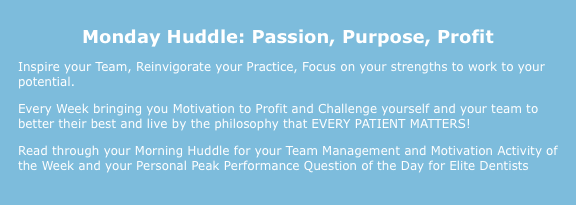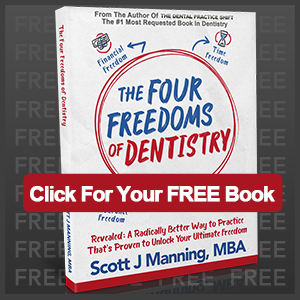We are picking up right where we left off. We have talked about what you ARE NOT “selling” and what you ARE “selling” by encouraging, motivating, and influencing your patients.
We also talked about where you get in your own way by either talking too much or too little, not keeping the patients’ engagement, you yourself not being fully focused, or ultimately lacking the necessary confidence about what you are advising the patient to do.
Yes, this boils down to the words you say, like most everything does, but it is also about non-verbal communication as well (the way you say things, the way you stand, holding eye contact, etc.).
I want you to be natural. I always say I don’t want to script you, make you robotic, or take away your personality. That said, I also don’t want you to be willy-nilly and just rush through the motions as though it’s no big deal. It takes conscious effort.
Since you are here reading this, I trust you are serious about what you do, value your role in the practice, and really want to do a great job in order to make a difference. That means you are a contributor to your practice success and to your patients’ overall health and well-being. Therefore, you want to do the things that get results.
So, we’ve been talking about “mistakes” and at the same time balancing those with the proper alternatives. Today, I will give you one more improvement that is simply a way to bring last week’s “be more confident” approach to life.
One of our absolutely best practices and Doctor (in terms of overall performance as well as culture), attended our most recent Advanced Training which is all about this very thing. They came up with a great phrase that I hadn’t thought of. These are the words we want to eliminate completely from our vocabulary…
“Waffle Words”
It’s brilliant and I give them all of the credit.
If you say certain words it appears as though you are unsure, you are waffling. Consequently, the patient feels that it is merely a suggestion or an option. It is not definitive in nature and they will most likely decline treatment or, at the very least, push back because of your timidity.
And what’s worse is more often than not behind those WAFFLE WORDS you will find your own self-sabotage whether under diagnosing or under presenting or un-selling what you have just talked about.
Obvious “waffle words” are…
“you could…”
“might be…”
“perhaps…”
“an option would be…”
And the list goes on. Honestly, their list was far better than mine. Now, I want you to come up with your own list.
Let’s come up with the list of the words that you are going to eliminate from your practice. Certainly, sometimes these words are good in a particular context (through an explanation of treatment or a discussion), but never as a final statement or recommendation of treatment.
You want to call each other out on these words and work hard to get rid of them because they destroy your case acceptance, erode credibility, and minimize authority with your patients.
At this specific training I gave a list of the opposite of “waffle words” that are persuasive, affirmative, encouraging, and influential words.
I’ll save those for another time (or better yet, you should earn the right to come to the training).
I will give you some ideas to add to your list of words not to say. There should never be such a thing as a “little filling” or “it’s really not that bad” or anything that makes the treatment seem unimportant.
It doesn’t have to be life and death and you don’t need to be dramatic BUT if you really care about your patients’ health and you know what’s best for them then it is absolutely essential to be persuasive and influential by utilizing your communication skills and verbiage.
Remember, WORDS MATTER. What you say can help or hurt every decision a patient makes. They impact the value patients perceive and their belief of the importance of treatment on their pathway to health.
So, time to get to work and make your list.



